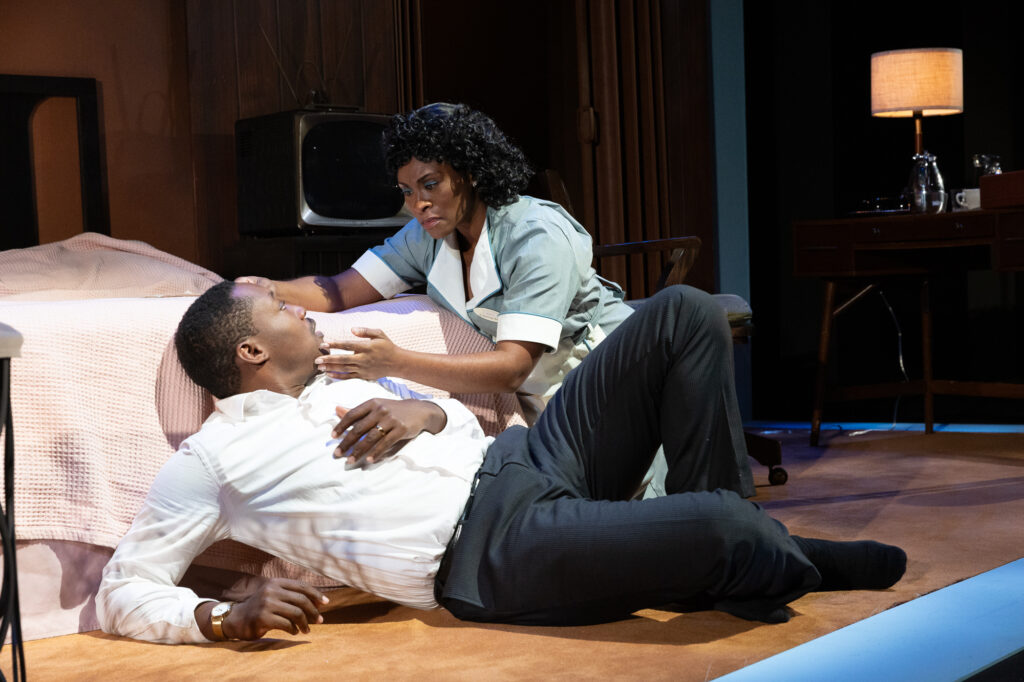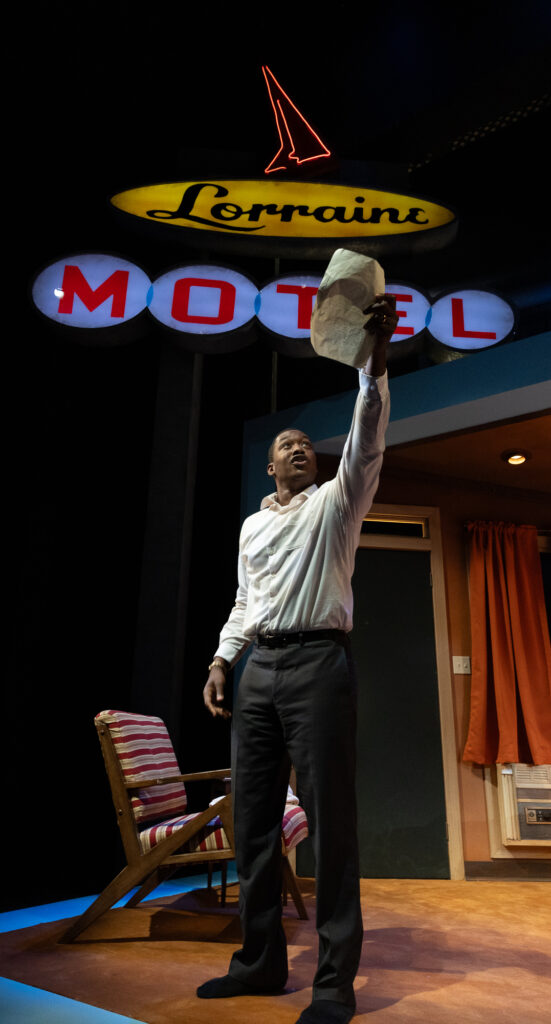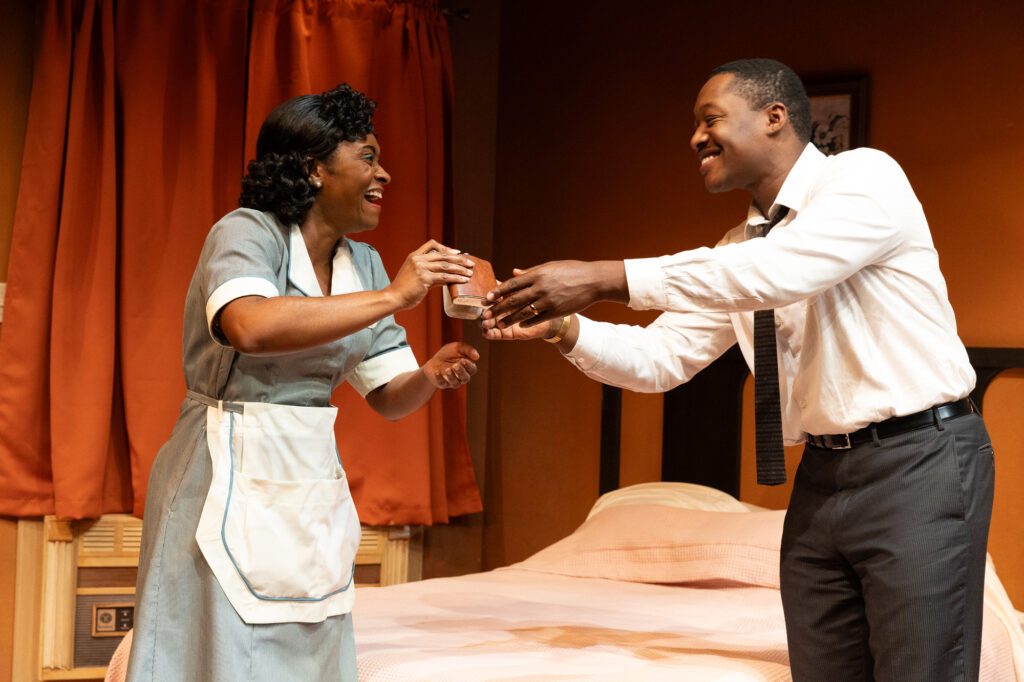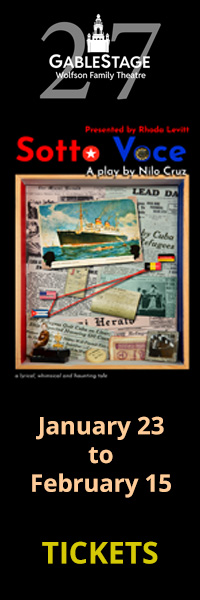
(Photos by Curtis Brown Photography)
By Bill Hirschman
“We’ve got some difficult days ahead. But it really doesn’t matter with me now, because I’ve been to the mountaintop…. Like anybody, I would like to live a long life…. But I’m not concerned about that now. I just want to do God’s will. And He’s allowed me to go up to the mountain. And I’ve looked over. And I’ve seen the Promised Land! I may not get there with you, but I want you to know tonight, that we, as a people, will get to the Promised Land!”
—-Martin Luther King Jr.’s Memphis speech the day before his assassination
Death and race and dreams intersect in Palm Beach Dramaworks’ stirring, powerful production of The Mountaintop. But there’s a special element if you have seen it before and another if you only know what occurred on April 4, 1968.
This profound drama leavened with a bit of humor imagines the night Martin Luther King Jr. spent in Room 306 of the Lorraine Motel where he was assassinated the next evening.
Katori Hall’s incisive script portrays a worn down quite human King polishing the next day’s speech when a lovely maid Camae brings him some coffee. He could use the company – as well as her proffered cigarettes. Her spirited attitude and profane language (“I’m cussing more than a sailor with the clap”) attracts him and she is clearly enamored of his greatness. They connect, laugh, flirt and interact as the talk becomes more serious about the past, then present, and future of racism and civil rights.
Both are far more than what we expect: Camae is more intelligent and thoughtful than we first think. King is a man of gravitas and import, but also a little vain, justifiably paranoid about the FBI and jumpy at every crack of lightning.
But here’s the rub: The play intentionally takes a decidedly left turn about halfway through that we don’t want to spoil – although some critics have done so. Suffice it to say – and this is probably going too far – we move from naturalism (despite hints of something off-kilter) into an unabashed fantasia.
If you’ve seen it or read it, you become another player as you pick up subtle clues and slight comments early on that presage what you know is to come. This is not a drawback but an added windfall.
 When the half-dozen themes merge they transcend specific eras and issues, like the need to “pass the baton” to a new generation of activists. It reflects all human beings faced with mortality reexamining what we done with our lives, how important it was, what were our accomplishments, where did we fail, what did we still need (or want) to do. Thus, this goes beyond the concept of immediate tragedy.
When the half-dozen themes merge they transcend specific eras and issues, like the need to “pass the baton” to a new generation of activists. It reflects all human beings faced with mortality reexamining what we done with our lives, how important it was, what were our accomplishments, where did we fail, what did we still need (or want) to do. Thus, this goes beyond the concept of immediate tragedy.
All of this is tied in directly with Camae’s recap of our past half-century which provides as stunning a finale to stick in your memory as with few other nights in theater.
Among the artistic miracles by director Belinda (Be) Boyd and cast members Christopher Marquis Lindsay and Rita Cole is how seamlessly they pace the journey and credibly pivot from humor to pathos and back again. The insightful script does go on a bit long but Hall has a lot she wants to say.
Boyd has helped Lindsay and Cole perfect these performances. Lindsay is a New York actor en route to Los Angeles who has stopped here to give us a gift. Tall, handsome and equipped with that impassioned, committed mien we expect of King, he is alternately the towering icon when the moment requires, but he simultaneously and off-duty is a flawed human being with a sense of humor, a loose libido and a prone to moody exhaustion.
He comes into the motel from a Biblical rainstorm, takes off his shoes, checks for wiretaps, paces the room, talking to himself as you do when you’re alone, practicing his speech for the next day, calls home to toy with his wife and kids. Later, he erupts with lava-like fury, and elsewhere falls to his knees praying for help as he begins to see the crippling flaws in himself.
Florida’s Cole, who had just played the sophisticated college educator in New City Players’ The Confederates, disappears into the persona of the low-income Memphis housekeeper whose accent calls the patron “Preechur Kang.” Her superb performance features a grinning face that seemingly communicates everything she’s thinking at first – and yet you can tell something is going on beneath as if she’s objective observer or an invested participant.
Foreboding lines include things like “Death is always just around the corner,” or “I’ll be doing this to the day I die.” These should sound club-footed but are perfectly uttered as any of us would in conversation.
Both actors deliver some amazing lengthy orations with a musical rhythm. But credit Cole with two amazing pieces, one when she stands on a bed pretending to be a civil rights preacher giving a rousing stump speech to the crowds, imbuing an articulate insightful message with a smidgeon of pleasure imitating the more over-the-top civil rights evangelists. The other is the penultimate finale with the power of an approaching hurricane.
But Lindsay gets the final call to arms benediction moving enough to get the audience instinctively on its feet a few seconds earlier than the now traditional standing ovation.
Kudos to Nikolas Serrano’s creation of a motel room, a backdrop of the motel with falling rain and notably the motel’s now iconic three-story sign by Technical Director Doug Wilkinson that glows and diminishes during the play. There’s even a black and white television that displays newsreel footage of King’s recent marches and a glimpse of Walter Crokite.
Again, it is difficult to describe some of the visual magic of Genny Wynn’s lighting and Adam J. Thompson’s projections without giving away justifiable surprises.
Hall’s script is mostly effective and challenging in switching between recognizable reality and fantasy, poignant drama and open-throated comedy, but all daubed over with a scrim of compassion for the universal plight of being doomed. She convincingly depicts a man with doubts not just about himself but about Humankind’s innate fear of who and what they aren’t familiar with. At one low point, King says of Blacks and whites, “We hate too easily. We love too easily.”
The play was produced at GableStage in 2017 in a fine edition with C. Anthony Jackson and Karen Stephens.
The Mountaintop through Nov. 9 at Palm Beach Dramaworks, 201 Clematis Street, West Palm Beach. 2 p.m. Wednesday, Thursday, Saturday, Sunday; 7:30 p.m. Wednesday, Thursday, Friday, Saturday. Tickets $95. Call (561) 514-4042 or visit https://www.palmbeachdramaworks.org/












 A PaperStreet Web Design
A PaperStreet Web Design
